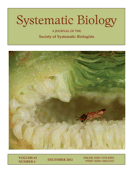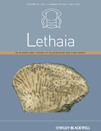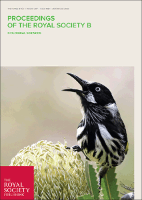
Systematic Biology
metrics 2024
Pioneering insights in ecology, evolution, and genetics.
Introduction
Systematic Biology is a premier journal published by Oxford University Press, dedicated to advancing the field of systematic biology through rigorous research and comprehensive reviews. Established in 1952, this esteemed journal has become a cornerstone of scholarship in Ecology, Evolution, Behavior and Systematics and Genetics, consistently ranking in the Q1 category as of 2023. With an impressive Scopus ranking—19th in Ecology and Evolution and 23rd in Genetics—Systematic Biology offers a platform for the dissemination of groundbreaking research, novel methodologies, and critical discussions that shape our understanding of biological diversity and evolution. While the journal does not currently offer open access options, it maintains a strong commitment to quality and integrity in publishing, ensuring that every article contributes meaningfully to the scientific community. Researchers, professionals, and students alike will find valuable insights and a wealth of knowledge within its pages, supporting their work and fostering a deeper appreciation for the intricate web of life.
Metrics 2024
 3.10
3.10 6.10
6.10 10.40
10.40 201
201Metrics History
Rank 2024
Scopus
IF (Web Of Science)
JCI (Web Of Science)
Quartile History
Similar Journals

LETHAIA
Bridging Disciplines in the Study of Life's HistoryLETHAIA, an esteemed journal published by Scandinavian University Press - Universitetsforlaget AS, serves as a vital platform for the dissemination of innovative research in the fields of paleontology as well as ecology, evolution, behavior, and systematics. Established in 1968 and continuing its impactful journey until 2024, LETHAIA has consistently contributed to advancing scientific understanding of Earth's biological and geological history. With a 2023 impact factor placing it in the Q2 category for both Paleontology and Ecology, Evolution, Behavior and Systematics, the journal is recognized for its high-quality, peer-reviewed articles that engage and challenge the academic community. Researchers, professionals, and students alike will find LETHAIA to be an indispensable resource for the latest findings, methodologies, and theoretical advancements in these interlinked disciplines.

npj Systems Biology and Applications
Elevating Systems Biology to New Heightsnpj Systems Biology and Applications, published by NATURE PORTFOLIO, is a premier open-access journal that has been at the forefront of the field since its inception in 2015. With a commendable focus on the interdisciplinary integration of applied mathematics, biochemistry, computer science, and drug discovery, the journal currently enjoys a Q1 ranking across multiple categories, showcasing its significant impact within the scientific community. In 2023, it ranked 70 out of 635 in Applied Mathematics and holds a notable place in the 89th percentile, confirming its esteemed reputation among researchers. Situated in the United Kingdom, this journal not only promotes innovative research in systems biology but also serves as an essential platform for the dissemination of high-quality studies that delve into modeling, simulation, and the application of biological systems in drug discovery processes. With an open-access model, authors can reach a broad audience, enhancing collaborations and advancing knowledge across disciplines, making it an indispensable resource for researchers, professionals, and students alike seeking to contribute to the evolving landscape of systems biology.

Communications Biology
Fostering Interdisciplinary Insights in Biological ResearchCommunications Biology, published by NATURE PORTFOLIO, is a premier open-access journal that has been at the forefront of biological sciences since its inception in 2018. With a remarkable impact factor and a strong reputation in the field, it has achieved prestigious Q1 rankings in Agricultural and Biological Sciences, Biochemistry, Genetics and Molecular Biology, and Medicine, highlighting its significance in disseminating cutting-edge research. The journal is renowned for its focus on innovative, interdisciplinary biological studies, making it an essential platform for researchers, professionals, and students alike, eager to contribute to and engage with the latest discoveries. With its commitment to accessibility, all articles published are openly available to the global research community, furthering the collaboration and advancement of knowledge in the biological sciences. For more information, access options, and submission guidelines, please visit the journal's website.

BULLETIN OF MATHEMATICAL BIOLOGY
Exploring the Mathematical Foundations of LifeBulletin of Mathematical Biology, published by Springer, is a premier journal dedicated to advancing the field of mathematical biology. With an ISSN of 0092-8240 and an E-ISSN of 1522-9602, this journal has been at the forefront of interdisciplinary research since its inception in 1973, continuing to deliver high-quality contributions through 2024. Operating without an open-access model, the journal maintains robust academic rigor, reflected in its category quartiles for 2023, which positions it in Q1 and Q2 across several relevant fields, including Agricultural and Biological Sciences, Biochemistry, Genetics, and Mathematics, among others. Its impressive Scopus ranks further underscore its significance, placing it in the top tier of journals in general mathematics and agricultural sciences. Researchers, professionals, and students looking to deepen their understanding and contribute to the evolving landscape of mathematical biology will find this journal an essential resource for contemporary studies and advancements in the field.

Austral Entomology
Connecting Basic Research with Practical SolutionsAustral Entomology, published by Wiley, is a leading journal in the field of entomology, specializing in the study of insects within the wider context of agronomy, ecology, and evolutionary biology. With an impact factor that reflects its growing influence and a commendable H-Index, this journal serves a vital role in disseminating cutting-edge research that bridges the gap between basic entomological studies and applied agricultural practices. Since its inception in 2014, Austral Entomology has maintained a strong commitment to open access, fostering a collaborative environment for researchers and practitioners. Recognized within category quartiles Q2 across multiple fields such as Agronomy and Crop Science and Ecology, it ranks impressively among journals in Insect Science, showcasing the significance of its contributions to understanding insect behavior, ecology, and systematics. Given its robust accessibility options, the journal not only enhances the visibility of entomological research but also empowers professionals and students alike to engage with and apply findings in real-world contexts.

BIOLOGICAL REVIEWS
Delivering high-quality insights in biochemistry and molecular biology.BIOLOGICAL REVIEWS is a prestigious academic journal published by Wiley, focusing on the expansive fields of Agricultural and Biological Sciences and Biochemistry, Genetics and Molecular Biology. Established in 1924, the journal has upheld its reputation for over a century, advancing both theoretical and applied research aimed at addressing critical biological challenges. With an impressive 2023 Q1 ranking in both its primary categories and a Scopus ranking that places it among the top journals worldwide—ranked #2 in Agricultural and Biological Sciences and #8 in Biochemistry—BIOLOGICAL REVIEWS is at the forefront of scientific inquiry. Researchers, professionals, and students will find a wealth of knowledge in its comprehensive review articles, providing valuable insights into the latest findings and methodologies in the biological sciences. Although not an Open Access journal, its rigorous peer-review process ensures the dissemination of high-quality, impactful research, contributing to advancements in the field while fostering a collaborative scientific community.

Evolutionary Biology
Bridging Disciplines in the Study of Life's DiversityEvolutionary Biology is a distinguished academic journal published by Springer, focusing on the intricate fields of ecology, evolution, behavior, and systematics. This journal, with the ISSN 0071-3260 and E-ISSN 1934-2845, has established itself as a critical platform for cutting-edge research and innovative ideas that shape our understanding of biological evolution and its implications. Operating from Germany, it ranks in the Q2 quartile in its category for 2023, placing it in the top tier of journals recognized for quality and impact, with a Scopus rank in the 66th percentile among its peers. Despite not being Open Access, this journal ensures comprehensive dissemination of knowledge essential for researchers, professionals, and students passionate about evolutionary studies. With a publication history tracing back to 1993 and converging years up to 2024, Evolutionary Biology continues to significantly impact the academic landscape, fostering dialogue and collaboration across various disciplines within the biological sciences.

PROCEEDINGS OF THE ROYAL SOCIETY B-BIOLOGICAL SCIENCES
Cultivating Insights in Biological DiversityPROCEEDINGS OF THE ROYAL SOCIETY B-BIOLOGICAL SCIENCES, published by the esteemed Royal Society, stands as a premier platform for disseminating cutting-edge research in the fields of Biological Sciences. With an impressive impact factor reflective of its high citation rates and scholarly contributions, this journal encompasses a wide array of disciplines, including Agricultural and Biological Sciences, Biochemistry, Genetics and Molecular Biology, Environmental Science, and Immunology and Microbiology, consistently ranking in the Q1 category across these fields. Since its inception in 1946, it has been committed to advancing our understanding of biological systems and informing evidence-based practices. Researchers and academics can submit their work without the Open Access barrier, thereby maintaining the integrity of the disciplinary discourse while providing comprehensive insights. The journal's location in the United Kingdom also positions it at the heart of global scientific innovation, making it a vital resource for professionals and students alike who are eager to explore the latest trends and breakthroughs in the biological sciences.

JOURNAL OF MATHEMATICAL BIOLOGY
Transforming Biological Questions into Mathematical Solutions.Journal of Mathematical Biology, published by Springer Heidelberg, is a leading international journal dedicated to the interdisciplinary field of mathematical modeling and its applications in biology. With an ISSN of 0303-6812 and an E-ISSN of 1432-1416, this journal has established its prominence within the academic community, reflected in its impressive rankings: Q1 in Agricultural and Biological Sciences (miscellaneous) and Q2 in both Applied Mathematics and Modeling and Simulation as of 2023. Covering a broad scope from ecological modeling to biomathematics, the journal serves as a crucial platform for researchers, professionals, and students alike to disseminate innovative work that bridges the gap between theoretical mathematics and biological phenomena. The journal, which spans from its inception in 1974 to 2024, emphasizes rigorous research while ensuring a high level of scholarly communication through its selective review process. With its solid reputation, the Journal of Mathematical Biology continues to significantly contribute to advancements in mathematical sciences and their essential role in understanding complex biological systems.

Biological Theory
Elevating Dialogue in Ecology and PhilosophyBiological Theory is an esteemed academic journal published by Springernature, focusing on the interdisciplinary realms of ecology, evolution, behavior, and philosophy of science. With an ISSN of 1555-5542 and an E-ISSN of 1555-5550, the journal had its converged years from 2006 to 2011 and from 2013 to 2024, reflecting its commitment to ongoing scholarly dialogue. Notably, it holds a prestigious Q2 ranking in Ecology, Evolution, Behavior and Systematics, and an impressive Q1 ranking in History and Philosophy of Science, highlighting its influential role in shaping discussions across these fields. The journal is well-received in the academic community, with Scopus rankings placing it in the 88th percentile for History and Philosophy of Science and the 59th percentile for Ecology, demonstrating its broad impact and relevance. Researchers, professionals, and students can access cutting-edge theories and critical analyses of biological concepts that contribute to a deeper understanding of life sciences without an open access model, further emphasizing the journal's significance in both historical and contemporary scientific discourse.